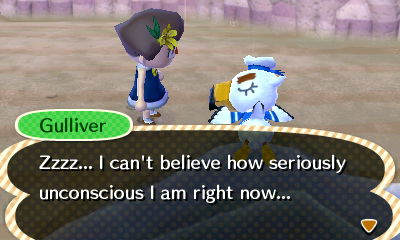Animal Crossing New Leaf has been hamstringing my mornings, forcing me to stay in the house an hour longer than I prefer to in order to do the following list of things:
-Check the T&T mart for the new available furniture
-Check the current going rate of tunips at Re-Tail
-Harvest fruit
-Pull weeds
-Dig up the daily fossils and gyroids
-Check the town plaza for any special visitors
-Check Nook’s store for any exceptional home remodeling items
-Rearrange house with newly received items that I ordered yesterday
-Visit the island and catch bugs and fish to earn bells

This, all told, has added nearly an hour to my morning ritual. I have not adjusted my ritual in anyway to compensate for this, so it’s making me late. ACNL has replaced my morning Twitter feed check in the bathroom, meaning that I let the shower run while I sit idly on the toilet 5x longer than usual. More time, more water, and my reputation as a punctual employee are being consumed by the smiling faces of the adorable animal people of Bortburg. They will crush me with their never ending optimism and willingness to live a casual, carefree lifestyle unburdened by the pressures of real life.
None of my neighbors seem to have any great ambition in their lives, a problem exacerbated by the game’s lack of things to do outside of ruthlessly generating bells and redesigning your house. ACNL’s main gameplay is the constant drive for a bigger and better home, with more, better stuff, and more civic works projects for your cheapskate neighbors. The neighbors’ motivations are mostly to just exist. It seems like one of my jock neighbors loves working out, but I see nowhere for him to pump iron, or a way for him to do it. It’s as if their lives are a never-ending cycle of collecting unemployment checks, all the time in the world, but no resources with which to do anything.
The hollowness that sets in and has traditionally pushed me out of Animal Crossing games is somewhat alleviated by the game’s online connectivity and the sense of community and currentness you get from seeing large swathes of people updating their Tumblrs with pictures and stories from their worlds. Nintendo’s inclusion of a relatively easy to use (by Nintendo standards of course) photo uploader for in-game screenshots is a very forward-thinking touch.

It’s this weird blend of a real life and in-game digital community that makes the game something more than a glorified Farmville. Seeing certain neighbors eventually warm up to you over time is a great little touch that even the most character driven games fail to capture. Games like Mass Effect reward friendship, but the motivation is generally for a gauche sex scene or optimal ending. Something like the Last of Us successfully details a relationship building over time between characters, but it’s not optional, and your actions have virtually no bearing on the narrative. Animal Crossing instead makes it about friendship for its own sake, to become a confidant, to become trusted and granted access to the thoughts and whims of your neighbors.
The ritual nature of the game also plays into these friendships. There’s no replacement for time, and as in life, there’s no shortcut to earning someone’s trust. The fact that befriending someone, like Sable for example, is both completely optional and not obvious adds a certain appeal to it. She’s not interested in reaching out to befriend you, the ball is in your court. The fact that these reserved, shy, and in Sable’s case, tragic, characters are in a game ostensibly about exceedingly happy neighbors in the countryside adds a welcome realism. Even an idyllic countryside town is going to have some standoffish people in it.

The constant drive to be harvesting goods to sell for new items or cleaning up your town is the most game-y part of the experience, and it feels like more than a coincidence that getting caught up in this process overshadows the more pleasant social and aesthetic elements of the game; talking to your neighbors, writing letters, visiting your friends’ homes in the showcase, and just taking everything in. The urge to socialize is dimmed somewhat by the characters’ limited dialogue options, especially the vendors, who for the most part have nothing to say at all. Ironically, Blathers has been reduced to a self-stymying mute who no longer says much of anything. While writing in-depth personal stories for all of the games’ dozens of villagers is unrealistic, it can be difficult to bond with them when they all eventually offer the same kind of response (generally based on their personality type).
So why am I playing this so much? That’s the question I set out to answer when I started writing this, and I can’t say I’ve succeeded. As usual I’m probably reading too deeply into the game itself, but that’s one of its beauties, it is sort of what you make of it. I see:
-The collision between the obligations of work and developing friendships, which is its own kind of work.
-These in-game collisions having weird impacts on my real life work and social obligations.
-The dread of knowing all this effort I’m putting into something that operates, at least a little, on my emotional attachment to it will be eventually pushed aside and forgotten, left to devolve into a ghost town full of weeds and abandoned friends.
Verdict: Rituals are comforting
This is pretty much how I feel about this game, idk why I keep playing or what it is that makes it so pleasant (maybe just seeing the idyllic paradise that it represents?) but damn I love playing it for now.